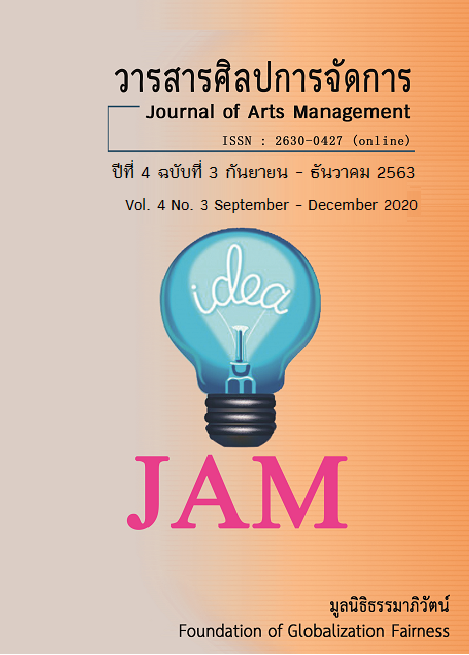Sustainable Development of Digital TV Business Operators: A Case Study of National Business Service Channel Group
Main Article Content
Abstract
The objectives of this research were 1) to analyze the factors of good corporate governance that influence on business sustainability; 2) to analyze the factors of media ethics standards that influence on business sustainability; 3) to analyze the factors of audience satisfaction that influence on Business sustainability; and 4) to give suggestions on the development of Digital TV operators. The study was a mixed methods research. 1) Quantitative research uses a research framework in good corporate governance concepts, Audience satisfaction, Media Ethics Standards, Business sustainability. Research area in 5 regions in Thailand (north, central, south, east, northeast). A sample of 500 cases were drawn from digital TV viewers, using simple random sampling method. Research tools used in this research were questionnaires, and 2) Qualitative research using purposive sampling methods and in-depth interview with the Digital TV business operator, Digital TV regulator (NBTC.), Digital TV viewers. Research tools used in the research were Semi Structure Interview.
The results of the study were as follows:
- 1. The research in objective 1: Good corporate governance had a positive influence on business sustainability.
- The research in objective 2: Media ethics standards had a positive and indirect influence on business sustainability.
- The research in objective 3: Audience satisfaction had a positive influence on business sustainability.
This research Digital TV operators should pay attention to good corporate governance, audience satisfaction and media ethics standards. In order to be effective and able to develop a Digital TV business sustainably
Article Details
Views and opinions appearing in articles in the Journal of Arts of Management It is the responsibility of the author of the article. and does not constitute the view and responsibility of the editorial team I agree that the article is copyright of the Arts and Management Journal.
References
ตลาดหลักทรัพย์แห่งประเทศไทย. (2557). ไขความหมายการพัฒนาอย่างยั่งยืน. กรุงเทพฯ: ศูนย์พัฒนาความรับผิดชอบต่อสังคม, ตลาดหลักทรัพย์แห่งประเทศไทย.
นิษฐา หรุ่นเกษม, ปรียา สมพืช, สิริมณฑ์ พึ่งสังวาลย์ และนิศรารัตน์ วิไลลักษณ์. (2561). การพัฒนามาตรฐานจริยธรรมพื้นฐานสำหรับสื่อมวลชน: แนวทางกำกับดูแลโชว์และเรียลลิตี้โชว์. กรุงเทพฯ: มหาวิทยาลัยราชภัฏพระนคร.
รุจิระ บุนนาค. (2561). เบื้องลึก...ปัญหาทีวีดิจิตอล. สืบค้นเมื่อ 5 พฤศจิกายน 2561. จาก http://www.marutbunnag.com/article/401/
สถานีวิทยุโทรทัศน์กองทัพบก ช่อง 5. (2553). โทรทัศน์ระบบดิจิตอล (Digital Television). สืบค้นเมื่อ 5 พฤศจิกายน 2561. จาก http://www.tv5.co.th/technics/tec_02_digital_tv.html.
เสาวนีย์ สมันต์ตรีพร. (2560). การบริหารทรัพยากรมนุษย์ในภาคธุรกิจในยุคการเปลี่ยนแปลง. วารสารวิชาการ มหาวิทยาลัยกรุงเทพธนบุรี, 6(1), 1-16.
สำนักงานคณะกรรมการกิจการกระจายเสียง กิจการโทรทัศน์ และกิจการโทรคมนาคมแห่งชาติ (กสทช.). (2557). คู่มือจริยธรรมและการกำกับดูแลกันเองในกิจการกระจายเสียงและกิจการโทรทัศน์. กรุงเทพฯ: กสทช.
สำนักงานคณะกรรมการกำกับหลักทรัพย์และตลาดหลักทรัพย์ (ก.ล.ต.). (2560). หลักการกำกับดูแลกิจการที่ดี สำหรับบริษัทจดทะเบียน ปี 2560. สืบค้นเมื่อ 8 กุมภาพันธ์ 2562. จาก https://www.sec.or.th/cgthailand/TH/Pages/CGCode/CGCodeIntroduction.aspx
อุไรรัตน์ สิงหนาท. (2560). แนวคิดการพัฒนาจริยธรรมมนุษย์ในยุคโลกไร้พร้อมแดนเพื่อรองรับ “สังคม 5.0”. วารสารวิชาการ มหาวิทยาลัยกรุงเทพธนบุรี, 6(2), 1-14.
Ashok, K. S. (2018). Impact of Corporate Governance on Sustainability: A Study of the Indian FMCG Industry. India: KIIT School of Management.
De Mendonca, T. R., & Zhou, Y. (2019). Environmental Performance Customer Satisfaction and Profitability: A Study among Large U.S. Companies. Sustainability, 11(5418), 1-15.
Maslow, A. H. (1943). A theory of human motivation. Psychological Review, 50(4), 370–396.


